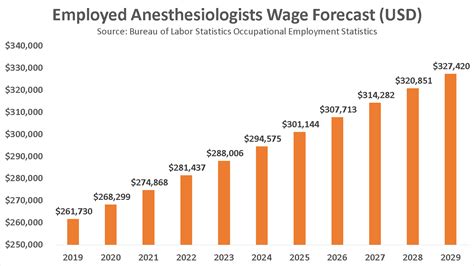Anesthesiologist Salaries: How Much Can They Earn?

As a medical professional, anesthesiologists are responsible for administering anesthesia to patients undergoing medical procedures. They play an important role in ensuring the safety and comfort of patients during surgical procedures. However, with such an important role comes a high level of responsibility, which is reflected in their salaries. In this article, we explore the topic of anesthesiologist salaries and provide an in-depth look at how much they can earn.
What is an Anesthesiologist?
An anesthesiologist is a medical professional who specializes in administering anesthesia to patients undergoing medical procedures. They are responsible for monitoring vital signs and ensuring that patients are comfortable and pain-free during surgical procedures. Anesthesiologists work closely with surgeons and other medical professionals to develop a plan for each patient’s anesthesia needs.
Anesthesiologist Salary Overview
Anesthesiologists are among the highest-paid medical professionals. According to the Bureau of Labor Statistics (BLS), the median annual salary for anesthesiologists in the United States is $267,020, as of May 2020. The lowest 10 percent of anesthesiologists earn less than $166,960, while the highest 10 percent earn more than $399,000 per year.
Factors Affecting Anesthesiologist Salaries
Several factors can affect anesthesiologist salaries, including:
- Geographic Location
- Experience and Education
- Employer Type
- Specialization
Geographic Location
Geographic location is one of the most significant factors affecting anesthesiologist salaries. Salaries can vary greatly depending on the state and even the city in which an anesthesiologist practices. For example, anesthesiologists working in metropolitan areas tend to earn higher salaries due to the higher cost of living.
Experience and Education
Experience and education are also important factors affecting anesthesiologist salaries. Anesthesiologists with more experience and advanced degrees tend to earn higher salaries. In addition, anesthesiologists who specialize in a particular area, such as pain management or pediatric anesthesia, may earn more than those who do not have a specialization.
Employer Type
The type of employer can also impact anesthesiologist salaries. Anesthesiologists who work in hospitals or healthcare facilities may earn different salaries than those who work in private practices or as independent contractors.
Specialization
Anesthesiologists who specialize in a particular area, such as cardiac anesthesia or pediatric anesthesia, may earn higher salaries than those who do not have a specialization. This is because specialized knowledge and skills are often in high demand and can command a higher salary.
Anesthesiologist Salaries by State
As previously mentioned, geographic location can have a significant impact on anesthesiologist salaries. According to the BLS, the top-paying states for anesthesiologists as of May 2020 were:
| State | Annual Mean Wage |
|---|---|
| Wisconsin | $402,010 |
| Montana | $401,590 |
| Wyoming | $401,010 |
| Minnesota | $380,320 |
| North Dakota | $372,020 |
How to Become an Anesthesiologist
Becoming an anesthesiologist requires extensive education and training. Here are the steps you need to take to become an anesthesiologist:
- Complete a Bachelor’s Degree
- Attend Medical School
- Complete a Residency
- Obtain Licensure and Certification
Complete a Bachelor’s Degree
Before attending medical school, you must first complete a bachelor’s degree. While there is no specific major required for medical school, you will need to complete certain prerequisite courses, such as biology, chemistry, and physics.
Attend Medical School
After completing a bachelor’s degree, you will need to attend medical school. Medical school typically takes four years to complete and includes both classroom instruction and hands-on clinical experience.
Complete a Residency
After completing medical school, you will need to complete a residency in anesthesiology, which typically takes four years to complete. During your residency, you will receive extensive training in administering anesthesia and caring for patients undergoing medical procedures.
Obtain Licensure and Certification
After completing your residency, you will need to obtain licensure and certification to practice as an anesthesiologist. This typically involves passing a series of exams and meeting other requirements set by your state’s medical board.
FAQs
What is the job outlook for anesthesiologists?
The job outlook for anesthesiologists is excellent. According to the BLS, employment of anesthesiologists is projected to grow 5 percent from 2019 to 2029, which is faster than the average for all occupations.
What skills are important for anesthesiologists to have?
Important skills for anesthesiologists include attention to detail, critical thinking, problem-solving, and communication. Anesthesiologists must also be able to work well under pressure and make quick decisions in emergency situations.
What is the difference between an anesthesiologist and an anesthetist?
An anesthesiologist is a medical doctor who specializes in administering anesthesia to patients undergoing medical procedures. An anesthetist, on the other hand, is a healthcare professional who administers anesthesia under the supervision of an anesthesiologist or surgeon.
What is the difference between general anesthesia and local anesthesia?
General anesthesia is a type of anesthesia that puts the patient into a deep sleep and eliminates all feeling and awareness. Local anesthesia, on the other hand, numbs a specific area of the body and allows the patient to remain conscious.
What are the risks of anesthesia?
While anesthesia is generally safe, there are some risks associated with its use. These risks can include allergic reactions, breathing problems, and complications related to underlying medical conditions. However, the risks of anesthesia are typically outweighed by the benefits of undergoing a medical procedure.
Conclusion
Anesthesiologists play an important role in ensuring the safety and comfort of patients undergoing medical procedures. Their salaries reflect the high level of responsibility and expertise required for their job. Anesthesiologist salaries can vary depending on several factors, including geographic location, experience and education, employer type, and specialization. To become an anesthesiologist, one must complete extensive education and training, including a bachelor’s degree, medical school, residency, and licensure and certification requirements. With a growing job outlook and a high demand for specialized skills, becoming an anesthesiologist is a rewarding and lucrative career choice.
